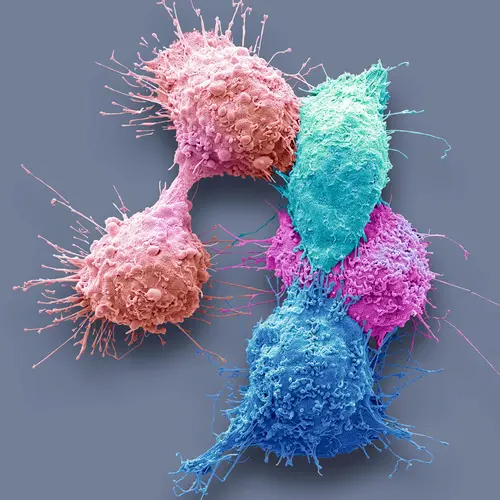To help gauge your chances of getting ovarian cancer, doctors can run a test of your blood -- or sometimes saliva -- called the BRCA gene test. It scans your DNA to pinpoint whether you have a mutation, or change, in one or two genes: BRCA1 and BRCA2. These genes usually protect you from getting breast or ovarian cancers. But variants in them, which run in families, can make them not work as they should.
Other genes linked with higher chances of getting ovarian cancer include RAD51C, RAD51D, STK11 ATM, BRIP1, and others.
Who Should Get Tested
You’re more likely to be offered the test if there’s a history of ovarian cancer in your family. The general public usually doesn’t receive it. Only about 1.2% of women get ovarian cancer in their lifetime. However, around 40% of women who have a harmful BRCA1 variant, and about 15% of women who inherit a dangerous BRCA2 variant, will get ovarian cancer by the time they’re 70-80 years old.
However, even if you have a history of ovarian cancer in your family, you don’t always inherit the mutation.
Genetic testing might be an option for you if:
- You’ve had or been diagnosed with ovarian cancer.
- You’ve had at least two types of other cancers.
- You’re related to someone with BRCA1 or BRCA2 mutation.
- You have Lynch syndrome. Women with this inherited condition have a 9% to 12% chance of getting ovarian cancer in their lifetime.
- You have at least one relative who’s had cancer and meets the criteria for this type of genetic testing.
- You had a negative genetic test more than 3 years ago. Testing technology is always improving.
Special Populations
If you have Ashkenazi -- or Eastern European -- Jewish ancestry, your test might have a multigene panel, which scans for several genes and mutations at once. It’s common for people of this population to have three distinct BRCA1 and BRCA2 variations. This is called the founder effect, or founder variant, which can happen when groups are isolated by culture or geography.
Genetic Counseling
A genetic counselor is a certified professional who’s specially trained in medical genetics. They’ll walk you through your options, review your family history, and help you decide whether genetic testing can give insights that will improve your health. Most people interested in genetic testing have this type of counseling.
A genetic counselor also will help:
- Choose tests that will give you the most info about your chances of getting ovarian cancer.
- Guide you through the testing process, including talking about the tests’ accuracy and limits.
- Counsel you about the emotional, psychological, and social reactions you might have when you get your test results.
- Discuss the next steps in getting a diagnosis, and go over treatment options if needed.
- Advise you how to share your results with family members.
Getting Tested
A health professional will draw blood from a vein as with any other blood test. Then your sample is sent to a lab to analyze your DNA. Some tests use saliva.
It might take a few weeks for your results to come back. If it comes back positive, you do have a mutation that increases your chances of getting ovarian cancer. The good news is, this doesn’t mean you’ll get it, and there are ways to cut your risk further. The positive result can also put your health team on the alert to detect cancer early if it does show up.
Taking birth control pills long term -- 5 or more years -- has been shown to cut some women’s chances of getting ovarian cancer by as much as 50%. However, oral contraceptives bring other risks that must be carefully weighed with your doctor.
Surgical procedures that can lower risk are tubal ligation -- tying off the fallopian tubes -- or hysterectomy, which removes the uterus. But experts feel these should only be done if there’s another medical reason to do so.
Genetic test results aren’t always clear-cut. If your test result is negative, you might not be scanned for the mutation. But you could still have another type of genetic change that hasn’t been linked to ovarian cancer yet. A “variant of uncertain significance” result means the lab found a mutation that may or may not be linked to ovarian cancer.
A negative test doesn’t have to be the end of your genetic testing. As with an uncertain result, check with your doctor or genetic counselor to see if there are other options.

